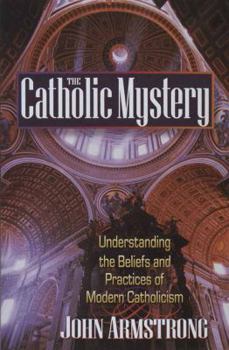Catholic Mystery
Where do evangelicals and Roman Catholics stand today? Have the recent steps toward ecumenism paved the way for a complete reconciliation in the new millennium? In a sensitive, thoughtful manner, John... This description may be from another edition of this product.
Format:Paperback
Language:English
ISBN:0736901035
ISBN13:9780736901031
Release Date:January 1999
Publisher:Harvest House Publishers
Length:214 Pages
Weight:0.53 lbs.
Dimensions:0.5" x 5.2" x 7.9"
Customer Reviews
2 ratings
An Excellent Introduction
Published by Thriftbooks.com User , 23 years ago
John Armstrong's _The Catholic Mystery_ makes for a quick, easy read, a succinct refresher on the essential differences between Protestants & Catholics, differences that have not faded in the 500 years since the Reformation. Armstrong does not intend this book to be a thorough, scholarly study. Instead, it is designed as a simple reminder, a reminder to contemporaries about the bases on which the Protestant Reformers took their stand -- sola scriputura, gratia, Christus, fide, etc. I (as a historian & a thoughtful Protestant) found nothing with which to take issue in regards to either Armstrong's history or his theology. He provides just enough historical background to give his readers a sense of time & place. He quotes just enough official Catholic documentation to effectively illustrate that the issues over which the Reformers fought still remain. For this reason, I found the book most helpful.One will have to look elsewhere for a detailed, scholarly discourse into the history behind & the theology emerging out of the Protestant Reformation. One will have to look elsewhere for an intricate historical understanding & defense of modern Catholic theology. _The Catholic Mystery_ is a place to begin, not a destination unto itself. Readers would be wise to keep this in mind & not expect this book to more than what Armstrong intended. It's a starting point, good for either a Protestant seeking to understand the essence of Catholicism or a Catholic seeking to understand substance of Protestantism.I found myself challenged by Armstrong's reminder that both Protestants & Catholics continue to share a common acceptance of early church doctrine, as prescribed in the early church creeds. It is only over the mid to late Medieval theological understanding of redemption for which the Reformers objected. I also appreciated Armstrong's reminder that it is in the Scriptures themselves (not in the Eucharist, in ancient tradition or ritual, or in subjective person experience) where the Reformers believed we meet God most clearly & resolutely. This is why preaching God's word is the focal point & climax to all Protestant worship services. I only take issue with Armstrong's conclusion, where he restates the differences between Protestantism & Catholicism most starkly. Despite Vatican II, Catholics must still look at Protestants as Xn brothers lacking in most of what is essential to fully experiencing the Xn faith (the Eucharist, ancient tradition & ritual, participation is a church directly descended from Apostolic authority, the headship of the Pope, etc.), while Protestants must continue to look at Catholicism as ultimately heretical in their presentation of the Gospel (particularly in the matter of Redemption) as recorded for us by the Apostles in the New Testament. However, it is my understanding that Catholicism, when interpreted properly, ultimately points the believer toward Xt, whether that's Xt through the church, Xt thro
Can you really tackle a mystery perfectly?
Published by Thriftbooks.com User , 24 years ago
Armstrong does an excellent job explaining the beliefs of Catholics from the Protestant side of things. I do not think that he chose his title well. You cannot tackle the Catholic mystery and explain it. He would have to write volumes to do that.What you can do and he does well is explain the different beliefs of Catholics and Protestants. I grew up in the Catholic Church and have read several books on both sides of the issue. I think that Armstrong's book is on top of my list for someone who is interested in feeling out both sides. Unfortunately, I have not found a Catholic writer who gives such a succinct case for Catholicism. I think that this is because there is too much to tackle. I often disagree with the Catholics who try to muddy the issues with talk of "mystery." The Christian faith is full of mysteries, but it is also full of truths.One example of Armstrong's relative (he is definitely Protestant)objectivity is his discussion of the different views of denominations on the Lord's Supper. Laying out exactly what the Catholic Catechism teaches, and what the others, Lutheran, Presb., etc.. believe, he allows you to make a decision.I can see how a Catholic would not be very impressed with this book, because it speaks in language that Protestants are accustomed to, but I think that it is a great book for launching discussion about the differences in the two factions. I think that it is a fantastic read for Catholics who are trying to understand the Protestant side. He discusses the three things that I find it hard for the two sides to ever find agreement on:1. The adoration of Mary 2. The re-sacrificing of Christ at every Mass3. The confusing blend of grace and works4. The infallable authority of the PapacyEach believer must take a side on these topics. They define the context of our faith. Armstrong's book is a great place to start when looking into these things.






